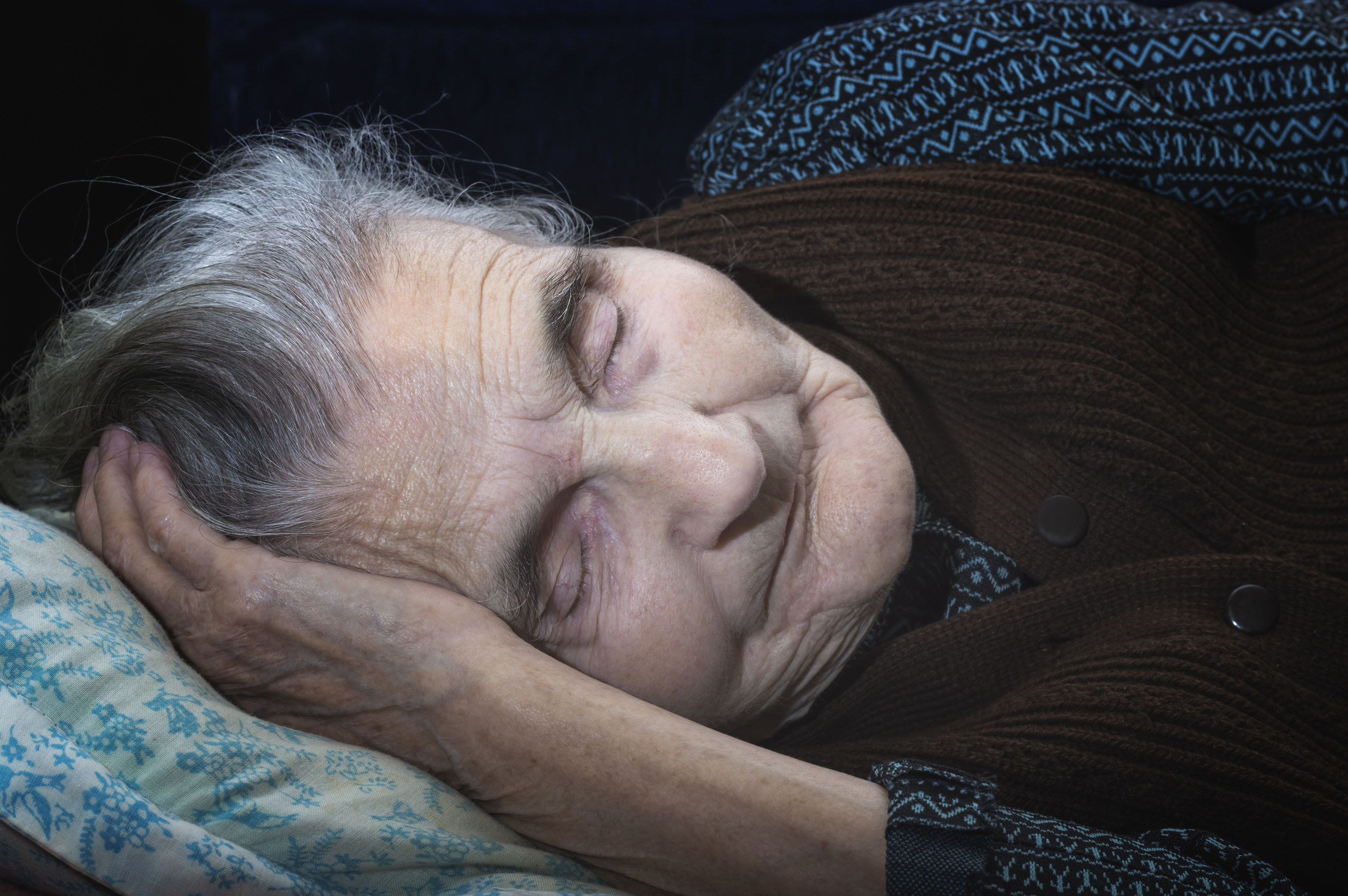This article is translated with AI and is based on Swedish conditions. Hopefully, it can inspire interested parties from other countries.
Sleep habits are important for quality of life. The need for sleep changes and many people require less sleep. Restless night sleep can engage both the resident and the staff due to increased risk of falling and disturbed neighbors. In elderly homes, there are residents who do not sleep at all and others who spend far too much time in bed. Many small measures can contribute to a better night's sleep.
 Foto: Mostphotos
Foto: MostphotosA relative of a resident at a nursing home reported that they had visited the nursing home at 6:30 in the evening. The resident was then tucked into bed and had already been given sleeping pills. For my part, I thought this belonged to a bygone era.
Sleep and Aging
A biological clock tells us when it's time to sleep. Body temperature drops, one becomes sleepy. The need for sleep is between seven and eight hours for most, while some manage with six hours of sleep. The need for sleep decreases with increasing age. By the age of 75, most people completely lack deep sleep. This leads to the elderly often waking up at night, which is normal. It is not a condition that should be medicated. To avoid the elderly getting up and injuring themselves, night alarms can be used that are triggered if the elderly get up.
Sleep habits and sleep quality can change as we age. The total sleep time usually decreases with age. Older adults tend to sleep shorter periods and have an increased tendency to wake up earlier in the morning. Often, the elderly wake up several times during the night and may have more difficulty falling back asleep. Likewise, the periods of deep sleep that contribute to recovery often decrease. This can result in a feeling of not being rested. Many take daytime naps. These can be short and used to reduce the feeling of fatigue.
It is important to remember that sleep habits and sleep needs can vary individually and that not all elderly people experience the same changes. Some can maintain good sleep quality and encounter no major sleep problems while others may need sleep support or sleep medication to manage any sleep-related problems.
What Stimulates a Better Night's Sleep
Regular sleep times are important and should be individually adapted. By going to bed and waking up at the same time every day, including holidays, the body's internal clock is regulated and contributes to better sleep. However, this should not mean that the staff at the nursing home tuck the residents into bed at six in the evening to have time to put everyone to bed, which happened in the past.
Make sure the bedroom is a calm and dark place suitable for sleep. Use blackout curtains, broken blinds that let in sunlight at three in the morning do not contribute to good sleep for the residents. Calm music can block out surrounding sounds and a pleasant room temperature contributes to a good night's sleep. Some nursing homes have lighting that is dimmed towards the evening to help stimulate a natural fatigue before going to bed. Routines that help the resident relax and signal to the body that it is time to wind down for the night. This can include activities such as reading, listening to calm classical music, or other calm and relaxing activities.
For many, a night meal can contribute to a good night's sleep. "Säröbomber" and other calorie-rich food can contribute to a natural fatigue before going to bed. Normally, the advice is to avoid stimulants like caffeine (e.g. coffee, tea, chocolate) and alcohol in the evening, as they can disturb sleep. When it comes to people with dementia, coffee can sometimes contribute to better night's sleep.
Those who are physically active during the day become tired in the evening and have better sleep quality. Try to schedule exercise earlier in the day, as exercise in the later hours can make the resident too alert to fall asleep. Avoid long daytime naps, especially in the afternoon and evening, as this can disrupt the natural sleep cycle and make it harder to fall asleep at night.
Relaxation techniques such as deep breathing, meditation, or reading before going to bed can help calm the mind and prepare the body for sleep. Activities that interest and distract during the day can also reduce worry and anxiety at night. As staff, you can for example give hand massages and sit for a while with someone who is anxious.
If difficulties sleeping continue, it may be important to get an examination by a doctor to rule out any underlying medical causes or side effects of medication.
Mapping Sleep
Always map sleep problems. Use a "sleep and activity schedule". Use pain assessment scales such as the VAS scale or Abbey Pain Scale if the elderly person cannot communicate what is wrong. Many sleep poorly because of pain and need pain treatment. Others may not be able to turn themselves and then a turning schedule and interventions and help from the staff may be measures that are required. To lie comfortably in bed, a good mattress, a comfortable pillow, and a moderately warm blanket are needed.
Many can advantageously sit up dressed in nightclothes and a bathrobe and can go to bed later. The most important thing is that the teeth are brushed and the incontinence protection is changed in connection with laying. Avoid giving sleeping pills to the elderly. Sleep medicine does not cure the cause of sleep problems and sometimes gives serious side effects like daytime sleepiness, dizziness, forgetfulness, and confusion, and an increased risk of falling.
Studies show that sleep medication has a limited effect on the elderly. The desired effect quickly diminishes as a result of habituation. The treatment often needs to be phased out to avoid ongoing sleep problems.
If someone is sedentary, for example in a wheelchair, it is important to think a little extra. The person may need to have a rest for 20 – 30 minutes. The rest should not be too long as it can affect night sleep. There are people who need to have several short rest breaks during a day.
At nursing homes, the staff's supervisory visits are often a disturbing element. Try to minimize the need for disturbing elements at night. Using motion alarms and well-functioning incontinence protection, for those who need it, can reduce the risk of disturbed night sleep. Likewise, there may be reasons to review the medication if the elderly have large amounts of urine just at night.
In home health care, a peek camera is now often used where supervisory visits are made via webcam at specific times during the night. There are also simple tools for registering night sleep and that can also give alarms at abnormal events, for example, Cenvigos Sängsor.
Night Fasting
If the night fasting exceeds 11 hours, the residents risk suffering from malnutrition. This in turn carries a risk of, for example, fall injuries and pressure injuries. The residents should not spend unnecessary time in bed.
Ensure that the residents receive regular and sufficient meals during the day. At least three main meals and in-between meals a few times. The last snack should be offered before going to bed. Offer the elderly the opportunity to choose their own meal times. Some elderly may have difficulty eating at traditional meal times and may prefer to eat later in the evening if this suits them better. Going to bed hungry or thirsty does not contribute to a good night's sleep.
If the resident does not eat properly, you in the team need to think about what is behind it. It can be, for example, medication side effects, swallowing difficulties, oral health problems, sitting position, or difficulties in perceiving the food that affect the ability to eat.
In order to evaluate night fasting, the operation needs to know how the resident has been offered meals. Adjust how and what you offer based on the resident's needs and wishes. By everyone in the unit working in an equivalent way, the operation can reduce night fasting and thus improve the residents' health and well-being.
Reflection Questions - Sleep
Care Staff:
- Are there aspects of good night's sleep in your implementation plan?
- Do you have joint discussions where the night staff have the opportunity to influence your way of working?
Manager, Nurse, Occupational Therapist, and Physiotherapist:
- To what extent are sleeping pills used in the unit?
- Do you have a good way of working to investigate sleep difficulties?
- Do you have health plans related to someone having difficulty sleeping at night?
Resident and Relative:
- Do you/your relative use sleeping pills?
- Is the night sleep good?
Erland Olsson
Specialist Nurse
Sofrosyne - Better Care Every Day

Aktuellt i media
- 2025-12-15 04:00 17 Psykisk hälsa
- 2025-12-11 04:00 07 Riskhantering
- 2025-12-08 04:00 06 Dokumentation
- 2025-12-03 04:00 06 Dokumentation
- 2025-12-01 04:00 02 Värdegrund
- 2025-11-27 04:00 13 Hygien







